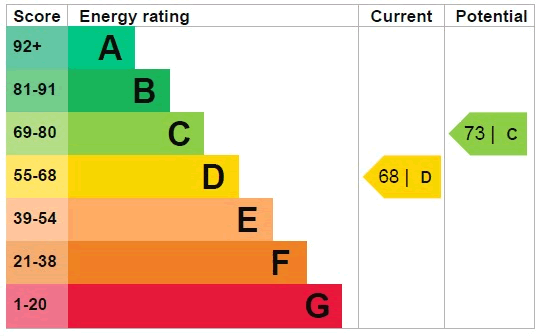Advice on the EPC legislation and what it means for you, the seller.
The Legislation
By law an EPC is required as soon as a property is placed on the market- with legislation furthermore stating that an EPC must be available for a potential purchaser to view on request. The responsibility to obtain an EPC is with the owner/seller. Complying with the legislation at the beginning of the selling process will avoid any risk of being fined, as a failure to do so could result in a £200 fine for every breach (one breach equating to one report that an EPC is not available for viewing). Furthermore, a sale cannot complete unless an Energy Performance Certificate is in place.
For further information concerning EPC legislation you can visit the Department of Finance and Personnel website at www.dfpni.gov.uk
What is an EPC?
An Energy Performance Certificate tells you how energy efficient your home is on a scale of A-G. The most efficient homes will have a rating at the upper end of that scale and will therefore be more energy efficient.
The certificate also advises on the impact your home has on the environment, and what improvements you could make to improve the rating of your property.
 How is an EPC Calculated?
How is an EPC Calculated?
In order to obtain your EPC it will be necessary to arrange an assessment of the property with a fully trained Domestic Energy Assessor (DEA). During this assessment the DEA will conduct a full survey of the property, recording specific details which are then input into unique software used to calculate the energy rating.
Details taken into consideration in an EPC calculation include -
- The age of the property
- The floor area
- The length of the external heat loss perimeter walls
- The thickness of the walls
- Cavity wall insulation and type
- Roof space insulation and depth
- Make, model and age of central heating boiler
- Type of central heating boiler and flue
- Method of heat radiation (radiators, under floor etc.)
- Number of Thermostatic Radiator Valves (TRVs)
- Number of fireplaces
- Form of any other secondary heating
- Type of windows
- Type, age and extent of double glazing (if any)
- Number of low energy light fittings
* The assessment time for an average 3 bedroom home is one hour- speed however is not the priority, as a more accurate and rigorous assessment will in turn lead to more accurate results.
Making recommended improvements
Included in your Energy Performance Certificate is a recommendation report which suggests ways in which you can improve on your home's energy efficiency to save you money and help the environment. There is no legal requirement to make the improvements, but the recommendations are designed to highlight the cost benefit and payback periods in addition to reducing your home's impact on the environment.
Additional Information
- The average UK rating of a domestic property is 'E' on the A-G scale. Please do not be concerned if your property does not reach the rating you expected as this depends on many factors - including the age of the property, type and age of boiler, insulation thickness etc.
- People who are interested in your home can request to see the EPC for the property to find out what the rating is and if they would like to make improvements.
- Viewers can request the EPC from your Estate Agent
Some property owners may also obtain an EPC simply to see where energy efficiencies could be made - even if they are not selling or renting out their homes. In doing so property owners could reduce energy waste, reduce costs and improve their energy rating for the future. A higher energy rating may also enhance the value of the property as energy costs continue to rise and therefore become an important selling factor.
